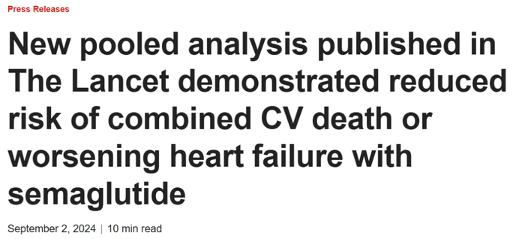The Lancet reports that semaglutide has the potential to be used in heart failure patients
September 5, 2024
Source: drugdu
 216
216

Recently, The Lancet published a new centralized, participant level analysis of heart failure patients with mild reduced ejection fraction or preserved ejection fraction (HFpEF) from four randomized placebo-controlled trials (2.4 mg for SELECT, STEP-HFpEF, STEP-HFpEF DM; 1.0 mg/d).
picture
According to analysis, semaglutide reduced the composite risk of cardiovascular (CV) death or worsening heart failure (HF) events by 31%, with incidence rates of 5.4% in the semaglutide group and 7.5% in the placebo group (HR 0.69; 95% CI 0.53-0.89; P=0.0045). semaglutide also reduced the risk of HF worsening by 41% (2.8% vs. placebo 4.7%; HR 0.59 (95% CI 0.41-0.82), p=0.0019).
Simeglutide had no significant effect on the incidence of CV mortality (3.1% in the Simeglutide group and 3.7% in the placebo group). Hr 0.82 (95% CI 0.57-1.16), p=0.25) The statistical analysis did not adjust for multiplicity, and the hazard ratio should not be used to infer definitive treatment efficacy. In the United States, semaglutide is not approved for use in heart failure.
This study is a summary and post hoc participant level analysis of 3743 patients with a history of HFpEF from four randomized trials, aimed at examining the effect of weekly administration of semaglutide (2.4 mg for SELECT, STEP-HFpEF, STEP-HFpEF DM; 1.0 mg/d) on HF events.
The STEP-HFpEF project includes HFpEF participants associated with obesity; In SELECT (participants with atherosclerotic cardiovascular (CV) disease and overweight/obesity) and FLOW (participants with type 2 diabetes and chronic kidney disease), the classification of HFpEF was reported by the researchers that the main endpoint of this combined analysis was the composite time of the first CV death or heart failure worsening event (hospitalization or emergency visit due to heart failure). Other endpoints include composite components: time of first HF event and time of CV death.
21% of patients in the semaglutide group and 13.9% of patients in the placebo group experienced adverse events caused by treatment interruption. 11.1% of patients in the semaglutide group and 2.7% of patients in the placebo group experienced gastrointestinal diseases caused by treatment interruption. Among the four trial populations, patients treated with semaglutide had a lower incidence of serious adverse events compared to those treated with placebo.
Regarding the SELECT test (2.4 milligrams of semaglutide)
SELECT It is a multicenter, randomized, double-blind, placebo-controlled, event driven superiority trial to evaluate the efficacy of smeglutide 2.4 mg as a standard cardiovascular nursing adjuvant treatment compared with placebo in reducing the risk of major adverse cardiovascular events in people with confirmed CVD and overweight or obesity who have no previous history of diabetes.
The experiment was launched in 2018, recruited 17604 adults, and conducted at over 800 research sites in 41 countries.
Regarding the STEP-HFpEF test (2.4 milligrams of semaglutide)
STEP-HFpEF is a 52 week, double-blind, randomized, placebo-controlled trial aimed at studying the effects of subcutaneous injection of 2.4 mg semaglutide once a week on symptoms, physical function, and weight in HFpEF and obese patients compared to placebo, both of which are added to standard care. STEP-HFpEF includes 529 symptomatic HFpEF (ejection fraction ≥ 45%) and obese (BMI ≥ 30 kg/m2) adults.
Regarding the STEP-HFpEF DM test (2.4 milligrams of semaglutide)
STEP HFpEF DM is a 52 week, double-blind, randomized, placebo-controlled trial to study the efficacy of subcutaneous injection of 2.4 mg smeglutide once a week on symptoms, body functions and weight of patients with HFpEF, obesity and type 2 diabetes. Compared with placebo, both are standard care. STEP HFpEF DM included 616 symptomatic adults with HFpEF (ejection fraction ≥ 45%), obesity (BMI ≥ 30 kg/m2), and type 2 diabetes.
Regarding the FLOW test (1mg semaglutide)
FLOW is a randomized, double-blind, parallel group, placebo-controlled, event driven superiority test to compare the effect of weekly administration of smeglutide 1.0 mg with placebo as an adjuvant treatment for kidney outcomes on the progression of kidney damage and the reduction of the risk of kidney and cardiovascular death in patients with type 2 diabetes and CKD. The experiment was conducted on 3533 adults at approximately 400 research sites in 28 countries. The FLOW experiment was launched in June 2019.
The main purpose of the FLOW trial is to demonstrate delayed progression of CKD and reduce the risk of renal failure, with eGFR decreasing by 50% or more compared to baseline (≥ 28 days), or death due to kidney related or cardiovascular reasons.
Read more on
- Gan & Lee Pharmaceuticals’ new PROTAC drug GLR2037 tablets have been approved for clinical trials to enter the field of prostate cancer treatment March 3, 2026
- AideaPharmaceuticals plans to raise no more than 1.277 billion yuan through a private placement to focus on the global clinical development of innovative HIV drugs March 3, 2026
- Giant Exits! Its Star Business Acquired March 3, 2026
- Focusing on cardiovascular and cerebrovascular diseases! OpenMediLead Medical Intelligence Dual Engines Launch Internal Testing, Connecting Drug Development and Clinical Diagnosis in a Closed Loop March 3, 2026
- Innovent Biologics Announces Approval of New Indication for BTK Inhibitor “Pitubrutinib” in China March 3, 2026
your submission has already been received.
OK
Subscribe
Please enter a valid Email address!
Submit
The most relevant industry news & insight will be sent to you every two weeks.



